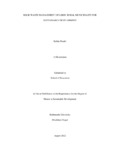
Please use this identifier to cite or link to this item:
https://hdl.handle.net/20.500.14301/108| Title: | SOLID WASTE MANAGEMENT OF LIKHU RURAL MUNICIPALITY FOR SUSTAINABLE DEVELOPMENT |
| Authors: | Paudel, Kabita |
| Citation: | Poudel, K. (2022). ‘Solid Waste Management of Likhu Rural Municipality for Sustainable Development. [Unpublished Masters Dissertation], Kathmandu University. |
| Issue Date: | Aug-2022 |
| School: | SOED |
| Department: | DODE |
| Level: | Masters |
| Program: | KUMSD |
| Abstract: | Solid waste is a significant issue for many developing nations i.e. Urban as well as in rural areas. Main problem of my Rural Municipality was non-degradable waste. So, I decided to know the understanding the practices of community people about solid waste management of Likhu Rural Municipality ward no.1 Shanti Tole, Nuwakot District of Nepal. The research addresses the research question: “How do people describe their understanding and practices of sustainable solid waste management?” I used an interpretive research paradigm to understand cultures of people on solid waste management as an insider and used an ethnography approach in my research. I took those five participants who were more engaged in the kitchen or non-kitchen activities. Throughout the data collection process, I did listening survey, unstructured interview with the selected participants and observation. I collected the data, then analyzed based on the occurrence of possible themes in interview answers and transcribed the data. Based on my finding, production and amount of waste vary to family type and the way of managing the degradable waste was same whereas varies in non-degradable waste which were collected at home in a different dustbin or some of them were thrown near rivers or near public places as well as burnt. For protection the environment and reduced the inorganic waste, rather dumping, adopted zero waste and 3 R concept, need to conduct the awareness program among the community people. Despite knowing the ways of sustainable waste management, many educated people did not follow whereas many of them adopted the 3R concept and zero waste management approach. |
| URI: | http://101.251.6.110:8080/handle/20.500.14301/108 |
| Appears in Collections: | Research Project |
Files in This Item:
| File | Description | Size | Format | |
|---|---|---|---|---|
| Kabita_ MSD_ Dissertation_ Final File.pdf | 604.18 kB | Adobe PDF |  View/Open |
Items in DSpace are protected by copyright, with all rights reserved, unless otherwise indicated.